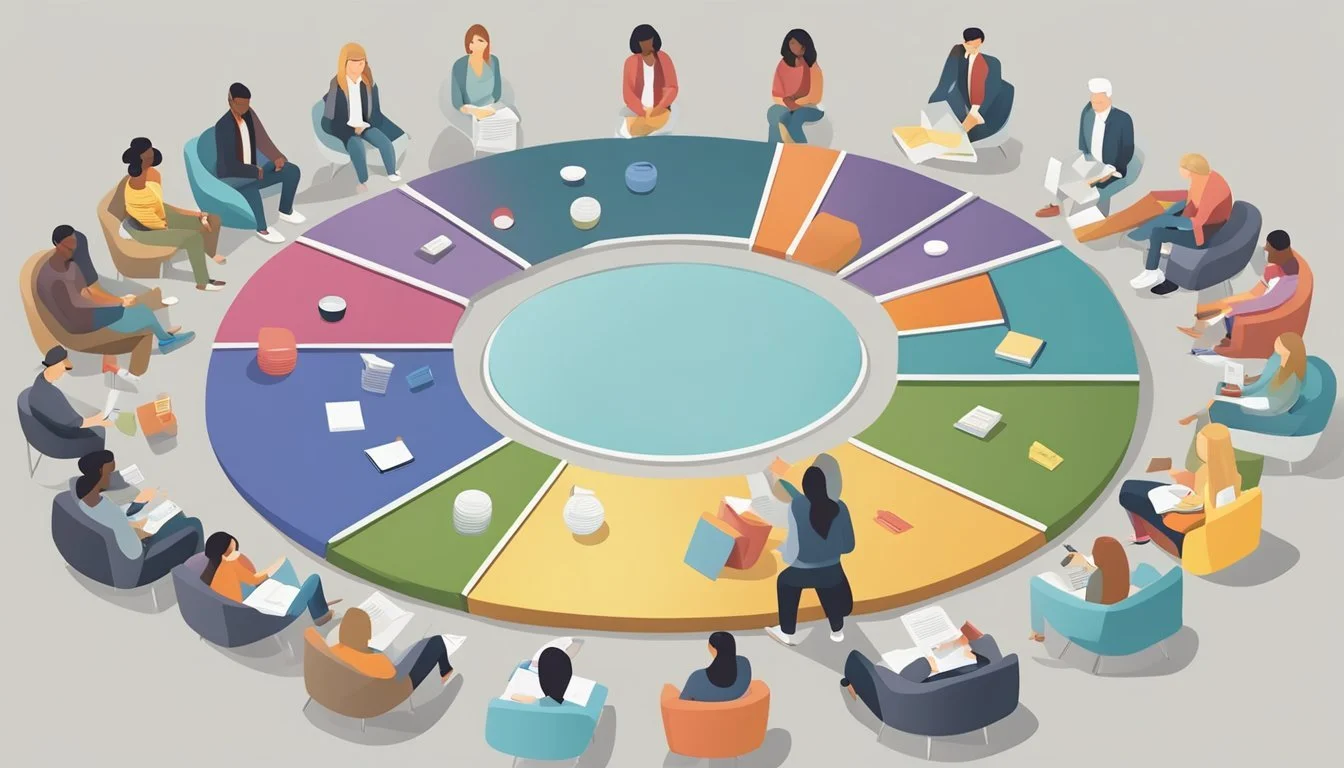Unlock Precision: Dive into the Intriguing World of DISC Personality Types C!
DISC personality assessments offer valuable insights into individual traits and behaviors. The C personality type, one of the four main DISC styles, represents individuals who are conscientious, analytical, and detail-oriented. C-type personalities value accuracy, precision, and logical thinking, often excelling in roles that require careful analysis and systematic approaches.
People with a dominant C style tend to be cautious and reflective, preferring to gather ample information before making decisions. They approach tasks methodically, striving for perfection and high standards in their work. C-types are typically skilled at spotting potential issues and developing well-thought-out solutions.
Understanding the C personality type can enhance team dynamics and improve communication in professional settings. While C-types may appear reserved or skeptical at times, they bring valuable perspectives and attention to detail that can benefit organizations. The Everything DiSC assessment provides a more nuanced view of C-type traits, helping individuals and teams leverage their strengths effectively.
Overview of DISC Personality Model
The DISC personality model is a widely used assessment tool that categorizes individuals into four distinct behavioral styles. This model provides insights into how people communicate, make decisions, and interact with others in various situations.
Historical Background
William Moulton Marston developed the DISC model in the 1920s. Marston, a psychologist and inventor, sought to understand human behavior through observable actions. His research led to the creation of a framework that identified four primary personality types.
Marston's work gained popularity in the 1940s when industrial psychologist Walter Clarke adapted it into a behavioral assessment tool. Since then, the DISC model has been refined and widely adopted in business, education, and personal development.
The Four Core DISC Styles
The DISC model comprises four main personality types:
Dominance (D): Direct, results-oriented, and assertive
Influence (I): Outgoing, enthusiastic, and optimistic
Steadiness (S): Patient, cooperative, and supportive
Conscientiousness (C): Analytical, precise, and systematic
Each style has unique characteristics, strengths, and potential limitations. People often exhibit a primary style with elements of the others.
Key Concepts and Principles
DISC assessments measure observable behaviors rather than internal traits. This approach focuses on how individuals act in specific situations.
The model emphasizes adaptability. People can adjust their behavior to improve communication and relationships with others who have different styles.
DISC recognizes that no style is inherently better than others. Each has its strengths and challenges. The goal is to understand and leverage these differences effectively.
Motivations and fears play crucial roles in shaping behavior within the DISC framework. For example, D-types are motivated by challenges and fear losing control.
Effective communication is a central principle of DISC. Understanding one's own style and recognizing others' styles can lead to more productive interactions and reduced conflict.
Understanding the 'C' Personality Type
The 'C' personality type in the DISC model represents individuals who are analytical, detail-oriented, and focused on accuracy. These individuals approach tasks with caution and skepticism, valuing precision and quality in their work.
Trait Characteristics of 'C' Styles
'C' style personalities are known for their logical and systematic approach to problem-solving. They prioritize accuracy and have high standards for themselves and others. These individuals are often reserved and objective, preferring to analyze situations thoroughly before making decisions.
'C' types excel at critical thinking and are meticulous in their work. They value expertise and competence, often seeking to expand their knowledge in their areas of interest. Their cautious nature leads them to question assumptions and scrutinize information carefully.
In social situations, 'C' personalities may appear reserved or aloof. They tend to be more task-oriented than people-oriented, focusing on facts and data rather than emotions or personal relationships.
Strengths and Limitations
'C' style individuals bring valuable strengths to teams and organizations. Their attention to detail ensures high-quality work and helps identify potential issues before they become problems. Their analytical skills make them excellent problem-solvers and critical thinkers.
These personalities excel at:
Producing accurate, high-quality work
Analyzing complex issues
Developing systematic approaches to tasks
Maintaining high standards
Limitations of the 'C' style can include:
Perfectionism leading to missed deadlines
Difficulty making quick decisions
Overcritical of self and others
Struggle with ambiguity or lack of structure
C Style in the Workplace
In professional settings, 'C' personalities thrive in roles that require precision, analysis, and expertise. They excel in positions such as:
Research and development
Quality control
Financial analysis
Systems design
'C' types prefer working independently but can be valuable team members when their strengths are recognized. They appreciate clear expectations, established procedures, and opportunities to demonstrate their expertise.
To collaborate effectively with 'C' personalities:
Provide detailed information and data
Allow time for thorough analysis
Respect their need for privacy and quiet work environments
Recognize their contributions to quality and accuracy
Interacting with 'C' Personality Types
Understanding how to effectively engage with 'C' personality types is crucial for successful collaboration. These analytical and detail-oriented individuals require specific approaches to communication, conflict resolution, and teamwork.
Communication Strategies
When interacting with 'C' types, focus on facts and details. Present information in a clear, organized manner. Use data and evidence to support your points.
Avoid emotional appeals or vague statements. 'C' types appreciate precision and logical arguments.
Give them time to process information. They often need space to reflect before responding.
Use written communication when possible. This allows 'C' types to review information at their own pace.
• Be prepared with thorough explanations • Provide specific examples and data • Respect their need for privacy and personal space
Managing Conflict
Address conflicts with 'C' types in a calm, rational manner. Avoid emotional outbursts or personal attacks.
Focus on finding objective solutions. Present multiple options and analyze the pros and cons of each.
Give them time to think through the problem. 'C' types often prefer to consider all angles before making decisions.
Be open to constructive criticism. 'C' types may point out flaws or inconsistencies in plans or arguments.
• Use a problem-solving approach • Provide concrete evidence to support your position • Be patient and allow time for analysis
Building Effective Teams
Leverage the analytical skills of 'C' types in team settings. Assign them tasks that require attention to detail and critical thinking.
Create an environment that values accuracy and high standards. 'C' types thrive when quality is prioritized.
Provide clear guidelines and expectations. 'C' types perform best when they understand the parameters of their role.
Allow for independent work. 'C' types often prefer to tackle tasks individually before collaborating with others.
• Assign roles that match their analytical strengths • Set up systems for quality control and feedback • Respect their need for structure and organization
Comparing 'C' Types with Other DISC Styles
The 'C' personality type differs significantly from other DISC styles in their approach to work, communication, and problem-solving. These differences highlight the unique strengths and potential challenges of each style.
C vs D: Detail vs Speed
C-types prioritize accuracy and quality, while D-types focus on quick results and decisiveness. C-styles meticulously analyze data before making decisions, whereas D-styles act swiftly based on available information. In communication, C-types prefer detailed explanations, while D-types favor brief, direct conversations.
C-types excel in tasks requiring precision and thorough research. D-types thrive in fast-paced environments that demand immediate action. Collaboration between these styles can be challenging, as C-types may view D-types as rushed and impulsive, while D-types might see C-types as overly cautious and slow.
Effective teamwork between C and D styles involves balancing speed with accuracy. C-types can provide valuable insights to refine D-types' quick decisions, while D-types can help C-types prioritize tasks and meet deadlines.
C vs I: Analytical vs Persuasive
C-types approach problems analytically, relying on facts and logic. I-types, in contrast, use persuasion and enthusiasm to influence others. C-styles prefer written communication with detailed information, while I-styles excel in verbal, energetic interactions.
In the workplace, C-types focus on producing high-quality work independently. I-types thrive in social settings, often excelling in sales and customer-facing roles. C-types may find I-types' approach too emotional or imprecise, while I-types might view C-types as overly critical or detached.
Collaboration between C and I styles can be highly effective when leveraging their complementary strengths. C-types can provide the data and analysis to support I-types' persuasive efforts, while I-types can help C-types present their ideas more engagingly.
C vs S: Systematic vs Supportive
C-types approach tasks systematically, focusing on processes and standards. S-types prioritize harmony and support, emphasizing teamwork and stability. C-styles communicate directly and factually, while S-styles prefer a more personal, empathetic approach.
In team settings, C-types often work independently to ensure accuracy, while S-types collaborate closely with others to maintain a positive work environment. C-types may view S-types as too accommodating or indecisive, while S-types might find C-types overly critical or detached from team dynamics.
Effective partnerships between C and S styles can create a balanced work environment. C-types can help establish clear procedures and quality standards, while S-types can foster team cohesion and ensure smooth implementation of processes.
Personal Development for 'C' Types
'C' personality types can benefit from targeted growth in key areas to complement their natural strengths. Developing flexibility, emotional intelligence, and collaboration skills can help 'C' types thrive in diverse workplace environments.
Boosting Flexibility and Adaptability
'C' types often prefer stability and may struggle with uncertainty. To increase flexibility, they can practice embracing change in small doses. This might involve trying new work methods or adjusting their routines periodically.
Setting stretch goals that push them slightly out of their comfort zone can build adaptability. 'C' types can also benefit from exposure to different perspectives and problem-solving approaches.
Developing a growth mindset is crucial. This involves viewing challenges as opportunities to learn rather than threats to their competence. 'C' types can keep a log of successful adaptations to reinforce their ability to handle change.
Improving Emotional Intelligence
'C' types tend to be private and may struggle in social situations. To enhance emotional intelligence, they can focus on active listening skills. This involves paying attention to non-verbal cues and practicing empathy.
Recognizing and naming their own emotions is an important step. 'C' types can benefit from keeping an emotion journal to track their feelings and reactions throughout the day.
Practicing self-expression in safe environments can help 'C' types become more comfortable sharing their thoughts and feelings. This might involve role-playing scenarios with trusted colleagues or friends.
Enhancing Collaboration Skills
'C' types often excel in individual work but may find teamwork challenging. To improve collaboration, they can start by identifying the unique strengths they bring to a team, such as attention to detail and analytical thinking.
Developing patience when working with different personality types is crucial. 'C' types can practice active participation in group discussions, offering their insights while remaining open to others' ideas.
Learning to delegate tasks and trust team members can be transformative. 'C' types might benefit from partnering with DI or CD style colleagues to balance their cautious approach with more action-oriented perspectives.
Application in Career and Business
C personality types excel in roles requiring attention to detail and analytical thinking. Their conscientious nature makes them valuable assets in fields such as accounting, research, and quality control.
In business settings, C types often thrive as data analysts, project managers, or technical specialists. Their ability to spot errors and maintain high standards contributes to improved processes and outcomes.
Careers well-suited for C personalities include:
Software Engineer
Financial Analyst
Lawyer
Scientist
Architect
C types bring precision and logic to team dynamics. They excel at creating systems, solving complex problems, and ensuring compliance with regulations.
Leaders with C personalities tend to focus on facts and data when making decisions. This approach can lead to well-informed strategies and risk mitigation in business environments.
Challenges for C types may include adapting to rapid change or dealing with ambiguity. Developing flexibility and interpersonal skills can enhance their effectiveness in diverse work settings.
Organizations benefit from C personalities' drive for excellence and accuracy. Their meticulous approach to tasks helps maintain quality and reliability in products and services.


